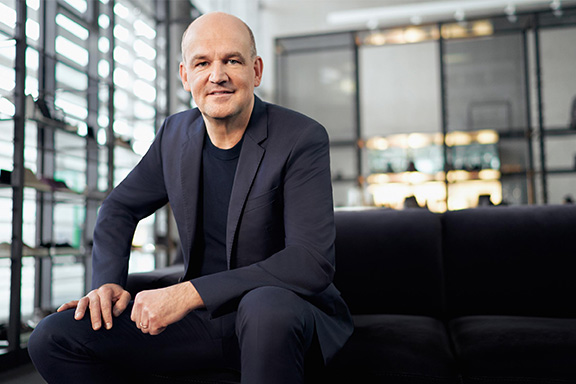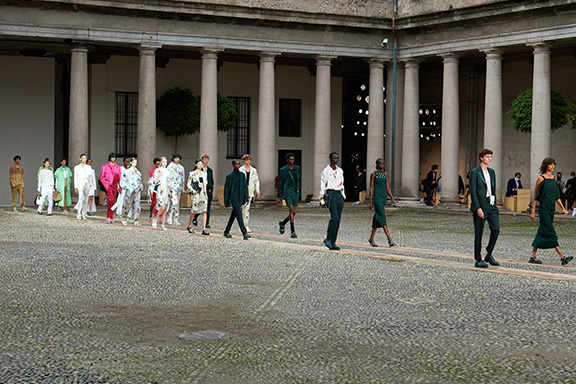Financial position
- Successful implementation of comprehensive measures to secure financial stability
- Significantly positive free cash flow generation in 2020
- Increase of syndicated loan and additional credit lines ensure financial flexibility
Principles and goals of financial management
Group-wide financial management is controlled centrally by the Group’s Treasury department. The goals pursued include securing financial stability and flexibility, ensuring Group-wide liquidity and managing financial risks. Group-wide financial management comprises Group financing, cash and liquidity management, the management of market price risks and the management of counterparty risks. Treasury principles which are applied Group-wide govern all matters relevant to treasury, such as the approval of banking relationships, the handling of financing agreements, liquidity and asset management as well as the management of currency and interest rate risks.
Within Group financing factors such as market capacity, cost of financing, covenants and terms to maturity are taken into account when selecting financial instruments. External loans for Group financing are taken out centrally and primarily in the Group’s reporting currency (euro) within the framework of an “inhouse bank” concept. To cover the financing needs of the Group companies, funds are made available in the form of intercompany loans. This allows the Company to increase economies of scale and to minimize the cost of capital. Occasionally, credit lines are also agreed with local banks in order to comply with legal, tax or other framework conditions. The Group’s financial liabilities are generally unsecured and may be subject to customary market obligations, which are reviewed on a quarterly basis.
The most important source of liquidity for the Group is the cash inflow from its operating activities. The Group’s central Treasury department optimizes and centralizes payment flows through its cash and liquidity management. Generally, Group companies transfer excess liquidity to the “inhouse bank”, e.g., as part of a cash-pooling procedure. In doing so, excess liquidity of individual Group companies can be used to cover the financial needs of others. This intercompany financial offsetting system reduces the external financial requirement and thus brings down net interest expenses.
Management of market price risks is intended to limit the impact of interest and currency risks on cash flow. The use of hedging instruments, including forward foreign exchange transactions, currency swaps and interest swaps, is intended to secure the Group against unfavorable price developments. Risk Report, Material Financial Risks
The counterparty risk with regards to banks mainly results from the investment of liquid funds as part of cash and liquidity management and from the use of derivative financial instruments as part of interest rate and currency management. With regards to trading transactions, the Group aims for the broadest possible distribution of volumes and ensures that financial instruments are generally only contracted with counterparties that have very good credit ratings.
Capital structure and financing
HUGO BOSS has secured its financial flexibility by means of a revolving syndicated loan with a term up to September 30, 2022. The syndicated loan agreement contains a standard covenant requiring the maintenance of financial leverage, defined as the ratio of net financial liabilities to EBITDA. The determination of financial leverage originally specified in the syndicated loan agreement and the level to be observed excludes the impact of any changes in accounting standards on the indicator. Thus, it remains unaffected by the impact of IFRS 16, which applies from 2019 onwards, on net financial liabilities and EBITDA.
In fiscal year 2020, HUGO BOSS exercised the option to increase its revolving syndicated loan to EUR 633 million in order to ensure additional financial flexibility during the COVID-19 pandemic (December 31, 2019: EUR 450 million). At the same time, HUGO BOSS has reached an agreement to suspend its covenants with its financing banks until June 30, 2021. At the end of the fiscal year 2020, EUR 105 million of the loan had been drawn (December 31, 2019: EUR 0 million). In addition, the Group has bilateral credit lines at its disposal with a total volume of EUR 198 million (December 31, 2019: EUR 337 million), of which EUR 161 million had been drawn at the end of the reporting period (December 31, 2019: EUR 215 million). HUGO BOSS also secured further loan commitments totaling EUR 275 million in fiscal year 2020. These are provided by six international banks and are partially backed by KfW, Germany’s state-owned development bank. At the end of the reporting period, these credit facilities were not drawn. Any loans claimed up to the end of the drawdown period on June 9, 2021 would be due on June 30, 2022. In addition, the Group had at its disposal cash and cash equivalents in the amount of EUR 125 million as of December 31, 2020 (December 31, 2019: EUR 133 million). Notes to the Consolidated Financial Statements, Note 15, Financial Position, Statement of Cash Flows and Free Cash Flow
The Group’s liabilities totaled EUR 1,811 million at the end of the fiscal year (December 31, 2019: EUR 1,876 million). This corresponds to a 70% share of total assets (December 31, 2019: share of 65%). This includes EUR 862 million attributable to short-term and long-term lease liabilities (December 31, 2019: EUR 957 million), primarily relating to the rental of retail stores as well as logistics and administration properties. Current and non-current financial liabilities totaled EUR 281 million at the end of the fiscal year (December 31, 2019: EUR 218 million). Net assets, Notes to the Consolidated Financial Statements, Note 8 and 9
Statement of cash flows and free cash flow
At an early stage of the COVID-19 pandemic, HUGO BOSS initiated comprehensive measures with a total volume of at least EUR 600 million aimed at protecting cash flow. These measures were successfully executed over the course of the year.
In particular, HUGO BOSS was able to significantly reduce its operating expenses. In this context, the Company has taken measures to adapt working hours for its global staff, thereby accounting for the respective pandemic conditions and taking into account applicable legal conditions. HUGO BOSS also significantly reduced sales and distribution expenses, in particular in own retail. Moreover, the Company has postponed all non-business-critical investments. In particular, planned renovations and openings of new retail stores were suspended until further notice where possible. HUGO BOSS was also able to achieve a significant reduction of merchandise inflow in close cooperation with its suppliers, particularly in the second half of the year. At the same time, the Company has adjusted its own production level to account for the currently lower demand. In addition, HUGO BOSS had suspended the dividend payment for fiscal year 2019, with the exception of the legal minimum dividend of EUR 0.04 per share, in order to further secure financial stability. By retaining the net profit, the Company has also strengthened its internal financing capability.
Free cash flow, measured as the total of cash flow from operating activities and cash flow from investing activities, amounted to EUR 164 million in fiscal year 2020 and was thus 64% below the prior-year level (2019: EUR 457 million).
At EUR 240 million, the cash inflow from operating activities was 63% below the prior-year level (2019: EUR 652 million). This development was mainly driven by the decline in sales and earnings in fiscal year 2020. However, the successful execution of the Group´s comprehensive measures to protect cash flow, enabled HUGO BOSS to significantly cushion the decline. The postponement of non-business-critical investments also led to a significant decline in cash outflow from investing activities of 61% to EUR 76 million in 2020 (2019: EUR 195 million). Financial Position, Capital Expenditure
Cash outflow from financing activities totaled EUR 167 million, thus 65% below the prior-year level (2019: EUR 472 million). The decrease reflects the lower dividend payment for fiscal year 2019 as well as a higher utilization of the Group’s credit lines as compared to the prior year.
Net financial liabilities
Net financial liabilities, measured as the total of all financial and lease liabilities less cash and cash equivalents, decreased slightly to EUR 1,004 million at the end of fiscal year 2020 (December 31, 2019: EUR 1,040 million). Lower lease liabilities and the successful execution of measures to secure cash flow more than compensated for the higher utilization of the syndicated loan. Excluding the effects of IFRS 16, net financial liabilities amounted to EUR 141 million (2019 excluding the effects of IFRS 16: EUR 83 million). Net Assets, Notes to the Consolidated Financial Statements, Note 8
Capital expenditure
In order to secure free cash flow during the pandemic, HUGO BOSS had adjusted its capital expenditure budget at an early stage, postponing all non-business-critical investments. At EUR 80 million, investments in property, plant and equipment and intangible assets in 2020 therefore came in well below the prior-year level (2019: EUR 192 million).
With capital expenditure of EUR 48 million, the focus of investment activity was again on the own retail network (2019: EUR 134 million). Investments in the continuous optimization and modernization of existing locations totaled EUR 27 million (2019: EUR 77 million) and include, for example, the relocation of the important BOSS store in New York’s SoHo district. At the same time, EUR 21 million was invested in selectively opening new retail stores (2019: EUR 56 million), with a strong focus on the strategic growth market of mainland China.
Capital expenditure on administration came to EUR 26 million in 2020 (2019: EUR 44 million). This mainly includes investments of EUR 22 million in the IT infrastructure (2019: EUR 34 million). In addition to further digitizing essential operational processes, HUGO BOSS also invested in the global expansion of its own online business. Other capital expenditure on the Company’s production, logistics and distribution capabilities and on research and development amounted to EUR 5 million in 2020 (2019: EUR 15 million).
Accumulated depreciation and amortization on property, plant and equipment and intangible assets, including own capitalized cost, totaled EUR 1,586 million in fiscal year 2020 (2019: EUR 1,238 million). Existing obligations from investment projects totaled EUR 2 million as at December 31, 2020 (December 31, 2019: EUR 9 million). Notes to the Consolidated Financial Statements, Note 8


